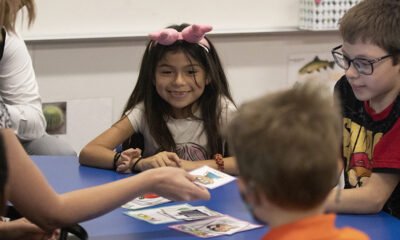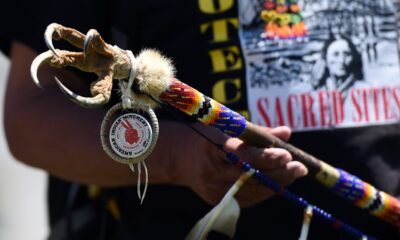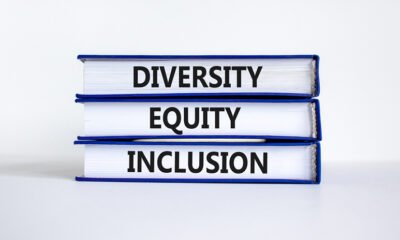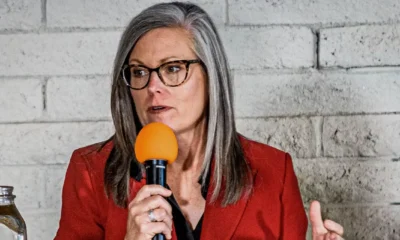Entertainment
Tribal Leaders Embrace VP Hopeful Tim Walz in Arizona: “No Turning Back”

Gila River Gov. Stephen Roe Lewis recently emphasized the necessity of mobilizing Native voters in Arizona during a visit from Minnesota Gov. Tim Walz. Speaking to a gathering of tribal leaders and voting advocates, Lewis highlighted the influence of Native votes in the 2020 election, where a mere 11,000 votes secured a victory for Joe Biden.
“Every vote matters — and every Native vote makes a difference,” Lewis declared on October 9. As the nation approaches the final phase of the election, he urged Democrats to acknowledge what he termed a “tribal wall” of five key swing states, including Arizona, that possess substantial Indigenous populations.
Arizona, Wisconsin, Nevada, North Carolina, and Michigan collectively hold significant tribal demographics. Lewis asserted that Indigenous voters could replicate their impact from 2020 by mobilizing for the upcoming elections. Currently, Indigenous individuals represent 6% of Arizona’s population, with approximately 300,000 eligible Native voters in the state.
Historically inclined to support Democrats, the tribal vote carries immense weight in closely contested elections. “The tribal vote has never been more important,” Lewis remarked.
On the same day early voting commenced in Arizona, Gov. Walz made a stop at the Gila River Indian Community’s Sheraton Grand Hotel. His presence aimed to galvanize tribal leaders and the broader Indigenous community to participate in the voting process. He underscored his administration’s commitment to supporting tribal sovereignty and the rights of Indigenous peoples.
“We’re not going back to the ways of the past, where communities were treated with condescension instead of collaboration,” Walz affirmed. He noted that past practices of only courting Native votes during elections are now obsolete.
“Those days are over. We work hand in hand,” he stated, pointing to his home state, which is home to 11 tribal nations. His lieutenant governor, Peggy Flanagan, is a member of the White Earth Band of Ojibwe, making her the highest-ranking Indigenous woman ever elected in the U.S.
Walz’s respect for tribal nations as equal partners could signify an unprecedented collaboration in the next administration. “You earn the Native vote long before you ask for it,” he remarked.
He addressed a group of over 20 attendees, emphasizing the current administration’s recognition and commitment to tribal sovereignty. “They understand what it means for the first people of this land,” he noted, clarifying that the Biden administration values the government-to-government relationships necessary for robust tribal representation.
Highlighting the importance of tribal nations at the national discourse level, Walz insisted that their inclusion in discussions is vital for the country’s success. “Our tribal nations are part of this discussion that makes our country great,” he said.
Lewis welcomed Walz, noting that his engagement reflects a commitment to the government-to-government relationship with tribes across the U.S. He pointed out that Walz’s tenure as Minnesota governor demonstrates a strong commitment to tribal sovereignty.
“Providing tribes with the necessary resources fosters innovation,” Lewis added, pointing to the Gila River Indian Community’s advancements in water conservation and sustainable energy practices.
Addressing the potential regression of tribal sovereignty, Lewis emphasized, “For Indian Country, we can’t go back, and we won’t go back.” He implied that such a return would signify a time when Indigenous rights were disregarded.
Mary Kim Titla, Executive Director of the United National Indian Tribal Youth (UNITY), attended Walz’s event, viewing it as an opportunity to discuss issues critical to Indigenous youth. Her organization focuses on leadership among young Indigenous people.
During the event, Titla highlighted mental health as a pressing concern among Indigenous youth, based on annual UNITY surveys. She stressed the need for increased funding and access to quality healthcare, urging the incoming administration to take note of these challenges.
“It’s crucial for them to understand that our voices matter,” Titla stated, expressing satisfaction upon hearing Walz affirm the administration’s commitment to addressing these issues. Her message underscored the importance of prioritizing Indigenous voices in national conversations.


















